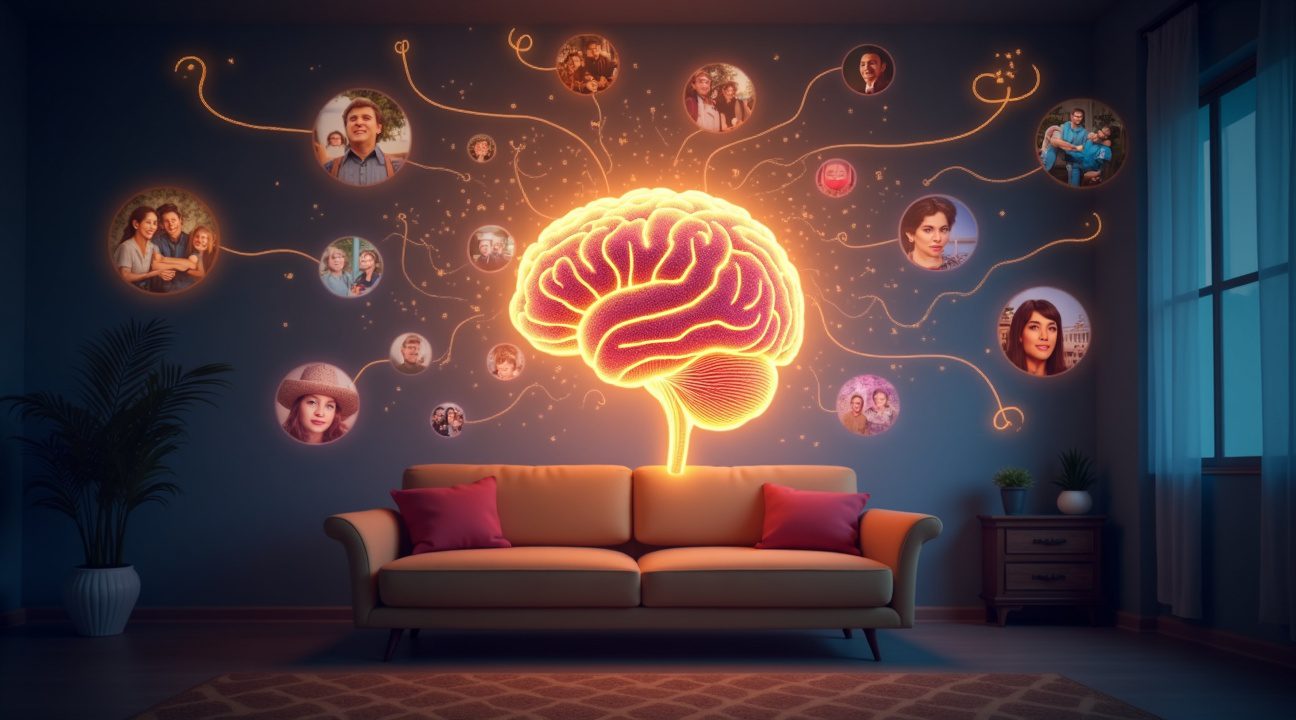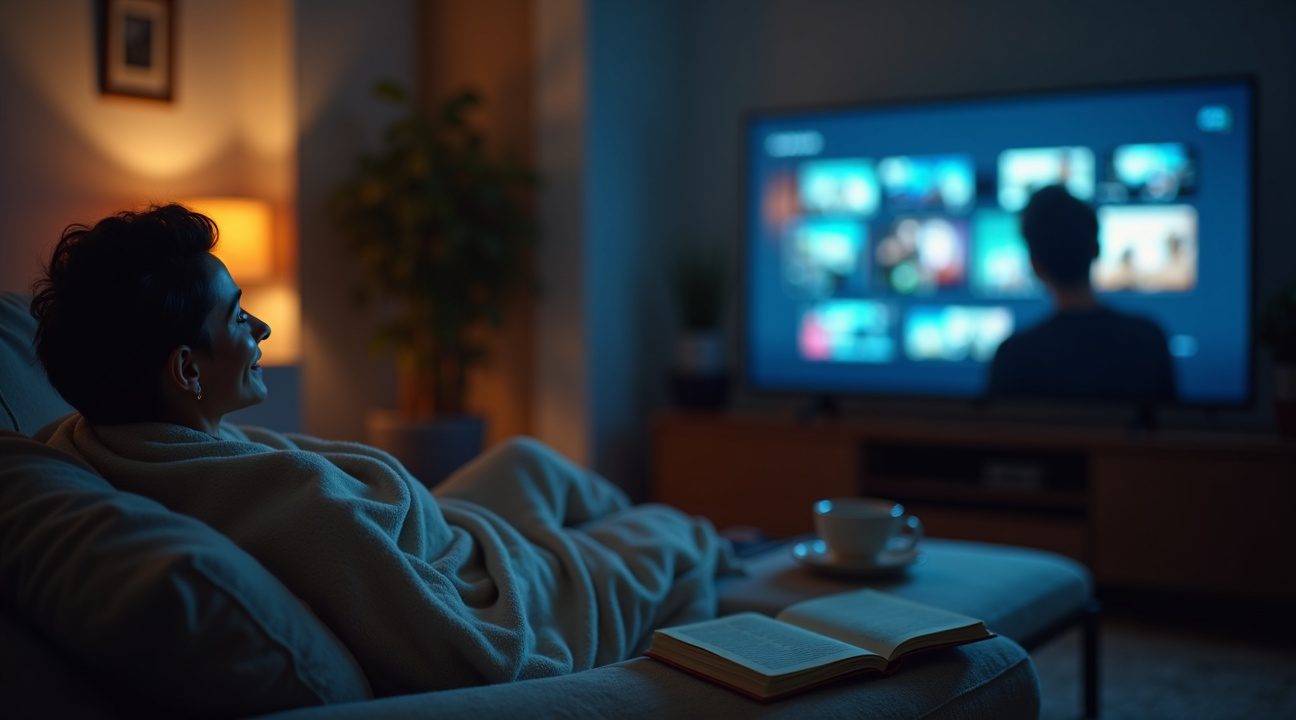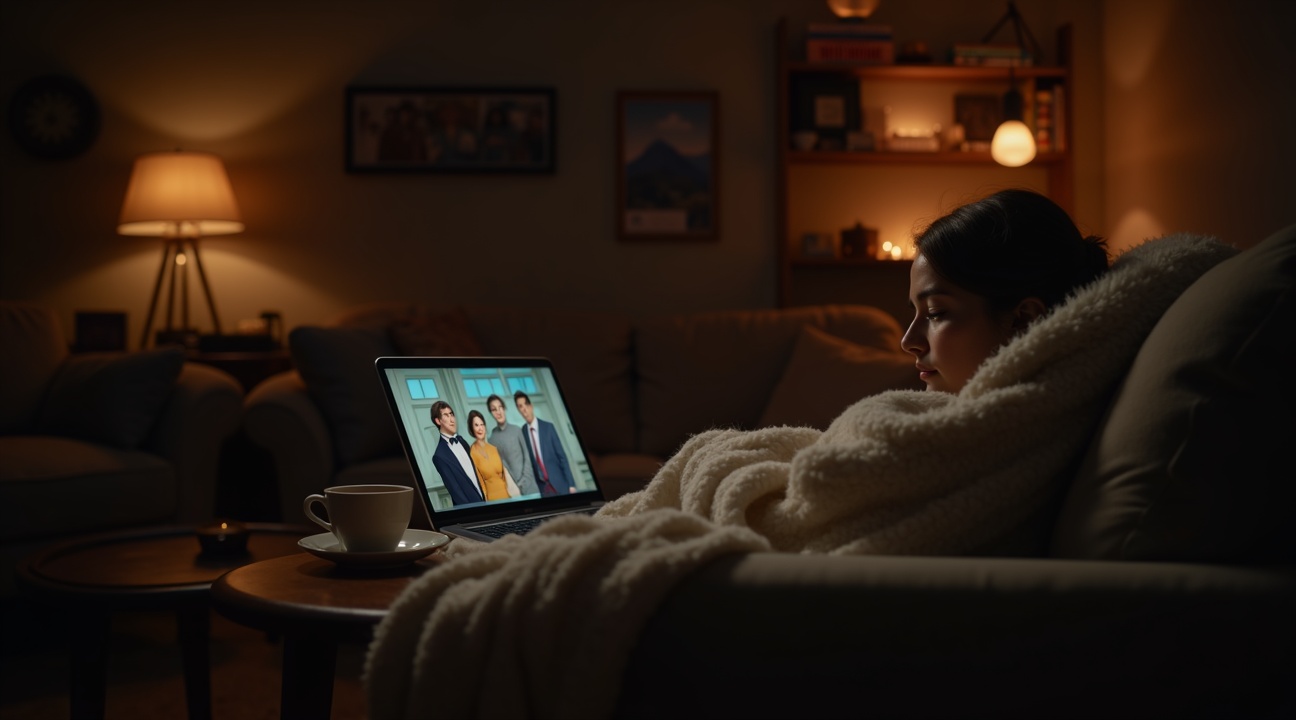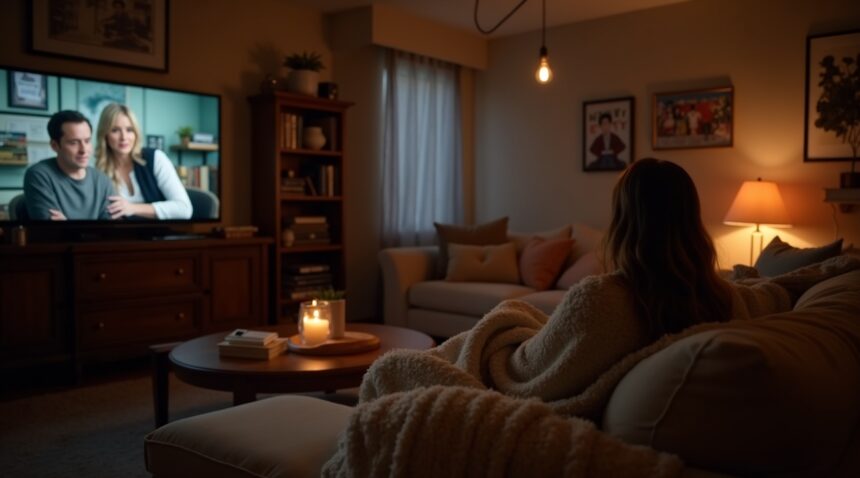Research conducted by Dr. Jaye Derrick at the University of Houston highlights a compelling link between emotional intelligence and the habit of rewatching familiar movies and television shows.
Key Takeaways
- People with higher emotional intelligence scores naturally gravitate to rewatching as a strategic tool for managing stress and negative emotions.
- Familiar content provides psychological comfort by eliminating uncertainty and allowing the brain to focus on emotional restoration rather than processing new information.
- Rewatching reduces cognitive load, enabling viewers to experience genuine relaxation and improved self-control compared to consuming new material.
- This practice serves as an adaptive coping strategy that helps emotionally intelligent individuals maintain psychological equilibrium during challenging periods.
- Comfort viewing represents sophisticated self-awareness rather than laziness, as these individuals recognize their emotional needs and actively work to meet them through strategic content choices.
Learn More About the Research
To explore more from Dr. Jaye Derrick and her findings, visit the University of Houston News page on comfort viewing research.
Rewatching Your Favorite Shows Actually Makes You Emotionally Smarter, Research Reveals
Scientists have uncovered something remarkable about people who can’t seem to stop watching The Office for the hundredth time or who’ve memorized every line from their favorite Marvel movie. Dr. Jaye Derrick at the University of Houston led groundbreaking research that revealed these repeat viewers aren’t just being lazy or unimaginative—they’re actually demonstrating higher levels of emotional intelligence.
The study shows that individuals who frequently revisit beloved films and television series experience substantial psychological benefits that go far beyond simple entertainment. Participants reported significant emotional relief, notable stress reduction, and measurable mood improvement after engaging with familiar content. This behavior represents a sophisticated coping mechanism that emotionally intelligent people use intuitively to manage their psychological well-being.
The Science Behind Emotional Intelligence and Repeat Viewing
Emotional intelligence encompasses the ability to recognize, understand, and effectively manage both personal emotions and those of others. Dr. Derrick’s research demonstrates that people with higher emotional intelligence scores naturally gravitate toward rewatching as a strategic tool for emotional regulation. These individuals understand that familiar content provides a safe psychological space where they can process stress and negative feelings without the unpredictability that comes with new material.
I find it fascinating that the study participants showed marked improvements in relaxation, comfort, and self-control specifically when rewatching versus consuming new content. This suggests that the predictable nature of familiar shows and movies creates an optimal environment for emotional restoration. The brain doesn’t need to work as hard to process known storylines, allowing more mental resources to focus on emotional regulation and stress recovery.
Why Familiar Content Works as Psychological Comfort
The research reveals several key factors that make rewatching such an effective emotional tool. Familiar characters and storylines provide psychological comfort because they eliminate the anxiety that can come with uncertainty. Viewers know their favorite characters will overcome challenges, that beloved relationships will endure, and that satisfying conclusions await them.
This predictability serves as a form of emotional anchoring during stressful periods. Just as pop culture influences lives in numerous ways, comfort viewing creates a reliable emotional refuge that people can access whenever they need psychological relief. The study participants used this strategy not as escapism, but as active emotional management.
Dr. Derrick’s findings also suggest that emotionally intelligent individuals recognize their own emotional states more accurately and choose appropriate responses. When they feel overwhelmed or stressed, they intuitively select familiar content that will provide the specific type of comfort they need. This represents sophisticated self-awareness and emotional self-regulation.
The research challenges common assumptions about repeat viewing being a sign of limited curiosity or intellectual laziness. Instead, it positions this behavior as evidence of emotional sophistication and self-care awareness. People who understand their emotional needs and actively work to meet them through strategic content choices demonstrate the kind of emotional intelligence that benefits all areas of life.
Interestingly, while some might assume that preferences for different entertainment types indicate varying personality traits, Dr. Derrick’s work shows that the key factor isn’t what people watch, but how they use their viewing choices to support their emotional well-being. Those midnight rewatches of Friends or Harry Potter movies aren’t time wasted—they’re evidence of emotional intelligence in action.
Your Brain on Reruns: The Fascinating Science of Why Familiar Content Feels So Good
The brain responds to familiar content in remarkable ways that explain why I find myself gravitating back to favorite shows and movies. When I rewatch something I’ve seen before, my brain experiences what researchers call the mere exposure effect, also known as the familiarity principle. This psychological phenomenon demonstrates that repeated exposure to familiar media increases perceptual fluency, making the viewing experience more pleasurable and significantly less mentally taxing.
The neural activity during first-time viewing differs dramatically from what happens during rewatching. Fresh content activates multiple brain regions simultaneously, creating a complex network of activity. The occipital lobe processes visual information while the auditory cortex handles sound. Meanwhile, the prefrontal cortex works overtime to analyze plot developments and character motivations. The hippocampus busily encodes new memories, and the limbic system manages emotional responses to unfamiliar situations and characters.
How Rewatching Changes Brain Function
During rewatching sessions, the brain operates more efficiently because it has already stored crucial information from previous viewings. Fewer hippocampal neurons are required since the brain doesn’t need to create new memories or work as hard to understand plot points and character dynamics. This reduction in cognitive load allows for a more relaxed viewing experience that requires less emotional effort.
The prefrontal cortex, which typically handles complex decision-making and analysis during new content consumption, can essentially take a break. Instead of working to predict outcomes or understand character motivations, it can focus on enjoying details that might have been missed during initial viewings. This shift creates space for deeper appreciation of cinematography, dialogue nuances, or subtle character interactions.
Dopamine release patterns also change significantly during rewatching. The brain’s reward system responds more strongly to familiar content because anticipation builds for favorite scenes, memorable quotes, or emotional moments. This enhanced dopamine response offers a larger reward compared to new shows, where uncertainty about outcomes can create anxiety rather than pure enjoyment.
Neural pathways become more streamlined with each rewatch, creating what neuroscientists describe as efficiency in processing. Pop culture influences extend beyond simple entertainment, actually reshaping how our brains process familiar narratives. The brain can dedicate more resources to emotional processing rather than information gathering, which explains why I often notice new emotional depths in characters or scenes during subsequent viewings.
This neurological efficiency translates into practical benefits for daily life. When cognitive resources aren’t depleted by trying to follow complex new storylines, the brain conserves energy that can be applied elsewhere. After a mentally demanding day, familiar content provides genuine restoration rather than additional mental strain.
The familiarity principle extends beyond individual shows to entire genres and storytelling patterns. Once the brain becomes accustomed to certain narrative structures, it can predict and enjoy the rhythm of familiar formats. Sitcoms like How I Met Your Mother benefit from this effect, as viewers develop comfort with recurring character dynamics and comedic timing.
Research suggests that this neural efficiency during rewatching correlates with increased emotional intelligence. When cognitive load decreases, the brain can focus more on subtle emotional cues, character development patterns, and relationship dynamics that might be overlooked during first viewings. This enhanced emotional processing contributes to better understanding of human behavior and social situations.
The science reveals that choosing familiar content isn’t laziness or lack of curiosity. Instead, it represents an intelligent use of mental resources that allows for deeper emotional engagement and genuine relaxation. Understanding these neurological mechanisms helps explain why entertainment preferences vary among individuals and why returning to beloved shows and movies provides authentic psychological benefits beyond simple nostalgia.

Why Anxious People Gravitate Toward the Same Shows Again and Again
When anxiety levels spike or emotional reserves run low, I find myself reaching for that same familiar comfort show without hesitation. This behavior isn’t random or lazy – it’s actually a sophisticated coping mechanism that anxious individuals use to regain psychological balance. Studies reveal fascinating insights about how our media consumption patterns reflect our emotional needs.
The Control Factor in Familiar Content
Familiar shows offer something precious to anxious minds: complete predictability. Unlike new content that demands constant attention and emotional investment, rewatching eliminates uncertainty and cognitive surprises. I know exactly when that funny scene will arrive, how the conflict will resolve, and which emotional beats will hit hardest. This foreknowledge creates a psychological safety net that allows the mind to truly relax.
Research by Shian-Ling Keng demonstrates this connection scientifically. Keng’s study found that anxious participants experienced significantly lower anxiety levels and reduced cognitive strain after rewatching familiar content compared to watching new material. The brain doesn’t have to work overtime processing new information, character motivations, or plot developments.
Reducing Mental Overload Through Repetition
Mental exhaustion makes decision-making feel overwhelming, even choosing what to watch. Familiar content removes this burden entirely. The brain can engage with pop culture content on autopilot, allowing deeper emotional processing to occur naturally. This creates space for genuine relaxation rather than the work of following new storylines.
Cognitive strain decreases dramatically during rewatching sessions because the brain allocates fewer resources to comprehension and more to emotional regulation. Anxious viewers often describe feeling “held” by their favorite shows – a sensation that comes from knowing exactly what emotional journey awaits them. This predictability becomes a form of self-control, allowing individuals to choose their emotional experience rather than having it chosen for them.
The repetitive viewing pattern also creates positive associations over time. Each rewatch reinforces the calming effect, strengthening the neural pathways that connect specific shows with relaxation and safety. This explains why certain series become deeply personal comfort objects rather than mere entertainment choices.
Video games and other interactive media can serve similar functions, but passive viewing requires even less cognitive effort. The combination of familiar narratives, beloved characters, and predictable outcomes creates an ideal environment for anxious minds to decompress without additional stress.
The Connection Between High Emotional Intelligence and Healthy Viewing Habits
People with higher emotional intelligence demonstrate a clear preference for adaptive coping mechanisms that support their mental well-being. Research reveals that these individuals gravitate toward healthy digital habits, including the conscious choice to rewatch beloved movies and television series rather than mindlessly scrolling through social media feeds or engaging in compulsive internet browsing.
Adaptive Coping Strategies vs. Maladaptive Behaviors
Individuals with strong emotional intelligence skills actively choose beneficial coping strategies during times of stress or emotional turbulence. Their viewing habits reflect this intentional approach to self-care. These emotionally intelligent viewers understand that familiar content provides psychological comfort and emotional regulation without the unpredictable triggers that new material might introduce.
Conversely, people with lower emotional intelligence often fall into patterns of maladaptive digital consumption. They’re more likely to engage in behaviors that ultimately harm their mental state, such as:
- Excessive social media scrolling that leads to comparison and negative self-perception
- Compulsive internet browsing without purpose or satisfaction
- Binge-watching random content as escapism rather than genuine enjoyment
- Using screens as avoidance mechanisms rather than conscious relaxation tools
The Broader Benefits of Enhanced Emotional Intelligence
Developing stronger emotional intelligence creates a ripple effect that extends far beyond viewing preferences. Students with higher EI consistently show improved academic performance, demonstrating better focus, motivation, and stress management during challenging periods. Their ability to recognize and regulate emotions translates into more effective study habits and healthier responses to academic pressure.
The physical health benefits of high emotional intelligence are equally compelling. People who can effectively manage their emotions experience reduced stress hormones, lower blood pressure, and improved immune function. This physiological advantage stems from their ability to process difficult emotions constructively rather than allowing stress to accumulate in their bodies.
Mental health outcomes also improve dramatically with enhanced emotional intelligence. These individuals develop greater resilience when facing life’s inevitable challenges, bouncing back more quickly from setbacks and maintaining more stable moods overall. Their viewing habits reflect this stability – they choose content that reinforces positive emotions and provides genuine comfort rather than temporary distraction.
Perhaps most significantly, people with higher emotional intelligence show decreased susceptibility to addictive behaviors across all areas of life. Their preference for video games and other entertainment remains balanced and purposeful rather than compulsive. They understand the difference between healthy enjoyment and problematic consumption patterns.
The relationship between emotional intelligence and viewing habits illuminates a broader truth about human psychology. Those who understand their emotional needs make deliberate choices about their entertainment consumption. They recognize that rewatching familiar content isn’t a sign of laziness or lack of curiosity – it’s an emotionally intelligent strategy for maintaining psychological equilibrium.
Pop culture’s influence on our daily lives becomes more apparent when viewed through this lens. Emotionally intelligent individuals curate their media consumption carefully, selecting content that aligns with their emotional needs and personal values. They’re less susceptible to the negative effects of problematic media because they approach consumption with intention and self-awareness.
This conscious approach to digital habits reflects a deeper understanding of personal emotional patterns. High-EI individuals recognize when they need comfort, stimulation, or distraction, and they choose their viewing accordingly. Rather than defaulting to whatever algorithm-driven suggestions appear on their screens, they make purposeful decisions about how to spend their leisure time.
The implications extend beyond individual well-being. Entertainment’s positive impact becomes more pronounced when consumed by emotionally intelligent audiences who can extract meaningful benefits from their chosen content. They transform passive consumption into active emotional self-care, demonstrating that the key to healthy media habits lies not in what we watch, but in how and why we choose to watch it.

Which Personality Types Are Most Likely to Binge the Same Content
Certain personality traits create distinct patterns in viewing behavior, with research revealing that specific psychological profiles drive people to repeatedly consume familiar entertainment. I’ve examined how these traits influence our desire to revisit beloved shows and movies, and the results offer fascinating insights into human psychology.
The Big Three Personality Drivers
Three core personality traits stand out as primary predictors of repeat viewing behavior:
- Openness to experience leads people to seek emotional depth and meaning in familiar narratives, with nostalgia serving as a powerful motivator (effect = 0.173)
- Agreeableness drives individuals to connect with characters and storylines that reinforce positive social bonds and shared values
- Neuroticism influences viewing habits as people use familiar content to manage anxiety and emotional regulation needs
Agreeableness emerges as the strongest predictor, directly increasing behavioral intention to rewatch content with an effect of 0.269. People high in this trait often gravitate toward comfort shows like sitcoms that emphasize friendship and community bonds.
Nostalgia and Social Connection as Motivating Forces
Nostalgia arousal acts as a significant mediator between personality traits and viewing behavior. This emotional trigger affects all three personality types, though with varying intensities.
- Individuals high in openness experience the strongest nostalgic pull (effect = 0.173)
- Those with agreeable personalities show nearly identical responses (effect = 0.182)
- People with neurotic tendencies demonstrate measurable nostalgic influences on their viewing choices (effect = 0.054)
Social connectedness plays an equally important role in repeat viewing behavior. Many viewers report feeling genuine relationships with fictional characters, creating parasocial bonds that satisfy real psychological needs. This phenomenon explains why pop culture content has such influence on our daily lives and emotional well-being.
Understanding these personality-driven patterns helps explain why some people become devoted fans of specific shows while others constantly seek new content. The research suggests that repeat viewing isn’t simply about entertainment preference—it’s a complex psychological behavior that serves important emotional and social functions for different personality types.
How Comfort Viewing Became Our Modern Stress Relief Strategy
Rewatching beloved movies and television shows has transformed into a widespread comfort viewing practice that serves as an emotional anchor during turbulent times. This phenomenon allows people to retreat into familiar narratives where they can predict every plot twist, anticipate each punchline, and immerse themselves in storylines that feel like old friends.
The appeal of comfort viewing lies in its ability to provide emotional relief when life feels overwhelming. Unlike new content that demands mental energy to process unfamiliar characters and unpredictable storylines, returning to favorite shows creates a safe psychological space. Viewers can relax completely, knowing exactly what will happen next, which reduces cognitive load and allows the mind to unwind naturally.
The Therapeutic Benefits of Predictable Entertainment
Comfort viewing offers several psychological advantages that contribute to overall well-being:
- Provides stability during periods of change or uncertainty
- Triggers positive memories associated with previous viewings
- Creates a controlled environment where outcomes are known and safe
- Reduces decision fatigue by eliminating the need to choose new content
- Offers a form of mental recovery similar to meditation
This practice has become particularly valuable in academic and professional settings where individuals face constant pressure to absorb new information. Students often turn to familiar shows between study sessions, finding that comfort sitcoms help reset their mental state before tackling challenging coursework.
The stability that comes from rewatching content extends beyond simple entertainment preferences. During emotional challenges such as breakups, job loss, or major life transitions, familiar shows become therapeutic tools that provide consistency when everything else feels chaotic. The characters become reliable companions who deliver the same comforting presence during each viewing.
Research indicates that pop culture influences extend far beyond surface-level entertainment, shaping how people process emotions and cope with stress. Comfort viewing represents a sophisticated emotional regulation strategy that demonstrates high emotional intelligence rather than escapism or laziness.
Modern viewers have increasingly embraced this practice as a legitimate form of self-care. The act of choosing familiar content over new releases reflects an understanding of personal emotional needs and the wisdom to prioritize mental recovery over novelty. This shift represents a mature approach to media consumption that prioritizes psychological well-being over cultural pressure to constantly consume fresh content.

Sources:
The Stuyvesant Spectator, “The Psychology of Rewatching”
PLOS ONE, “Investigating the mediating role of emotional intelligence in the…”
Frontiers in Psychology, “Behavioral Intention of Repeated Watching and Personality Traits”
Frontiers in Psychiatry, “Effect of emotional intelligence on problematic social media use…”
Psychology Today, “Why We Watch the Same Shows Over and Over”
Fielding Graduate University, “Reap the Benefits of Rewatching Your Favorite Movies”
Country 103.7, “Rewatching The Same Show Repeatedly Is Good For Mental Health”


